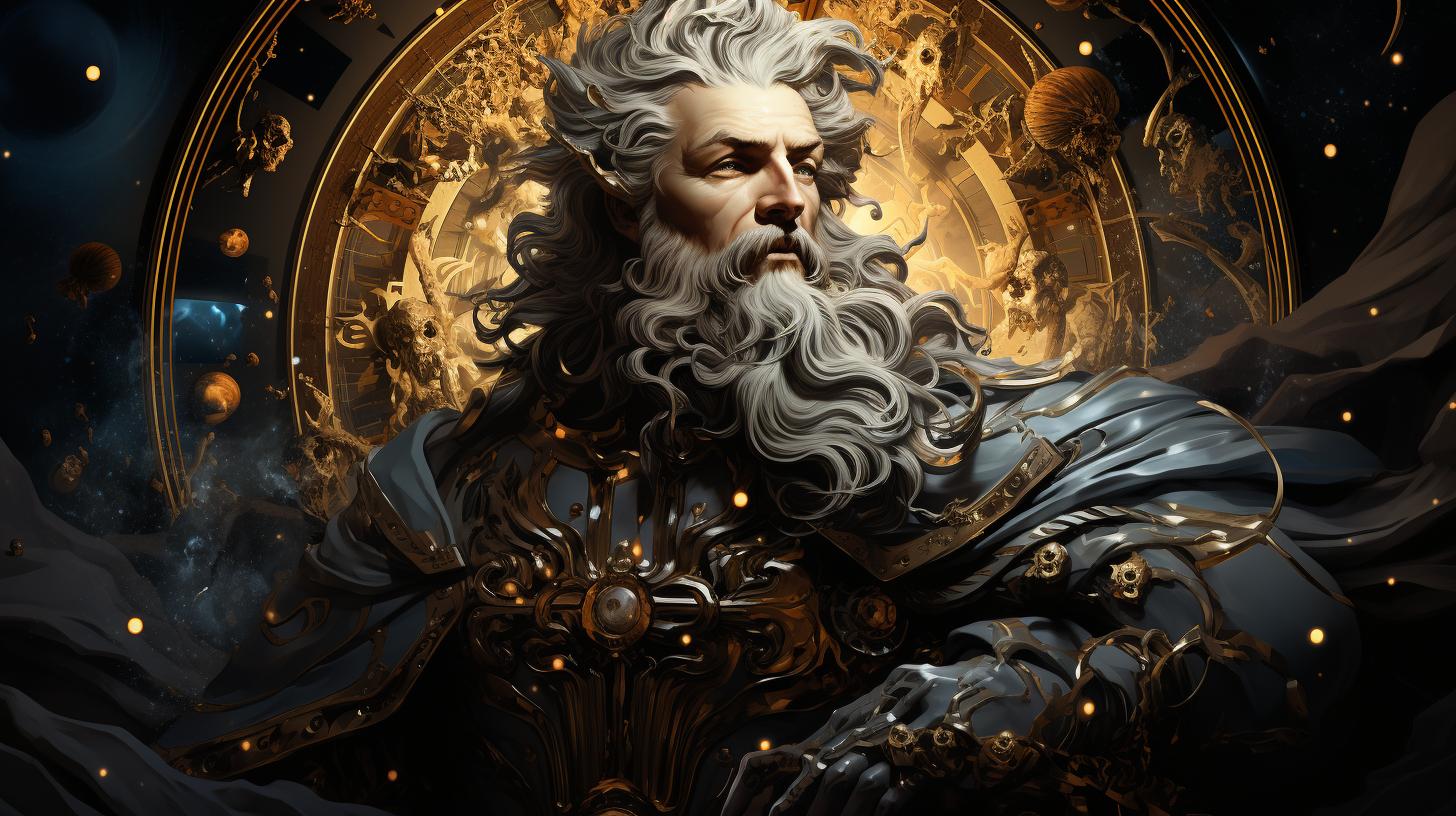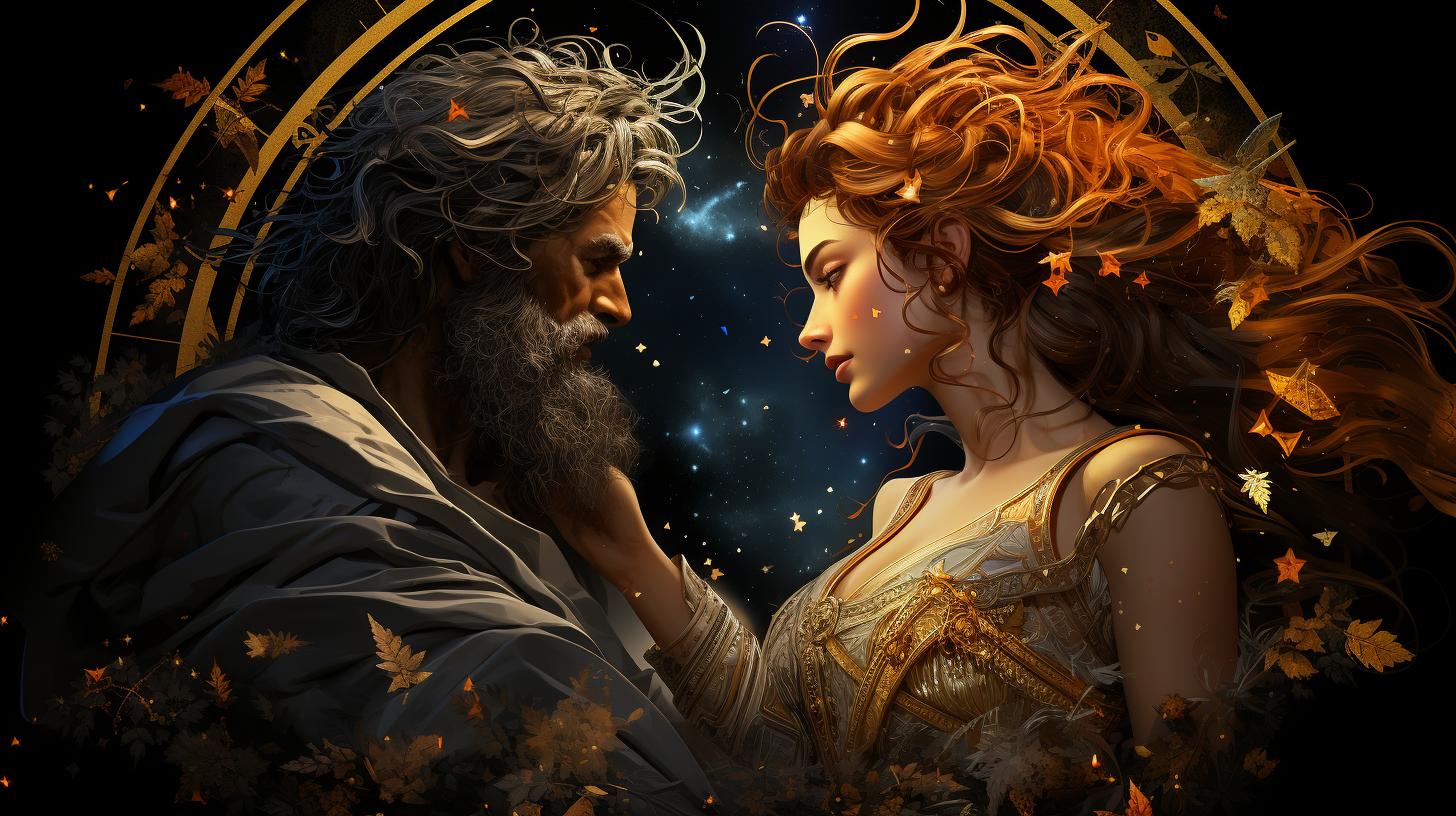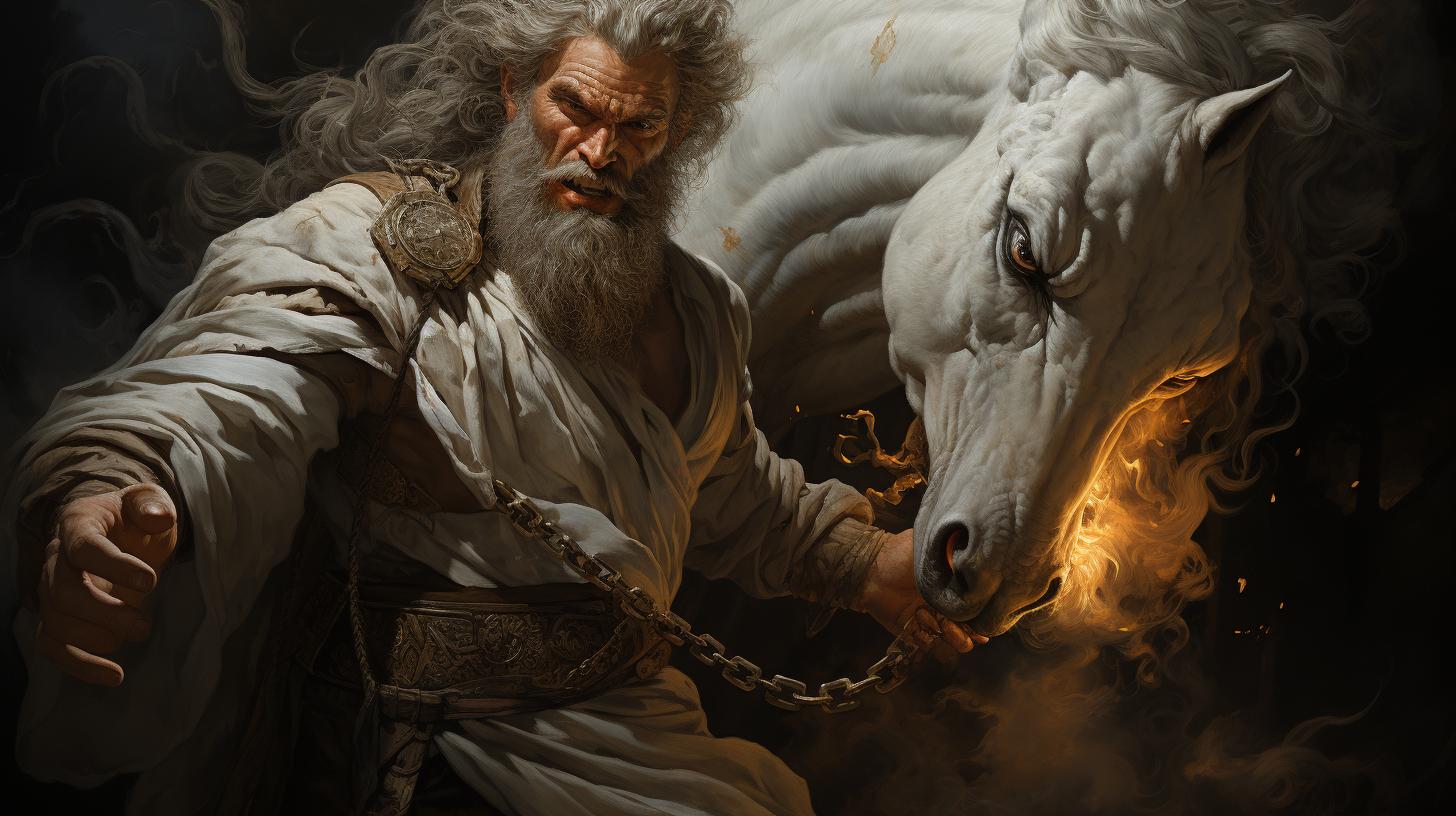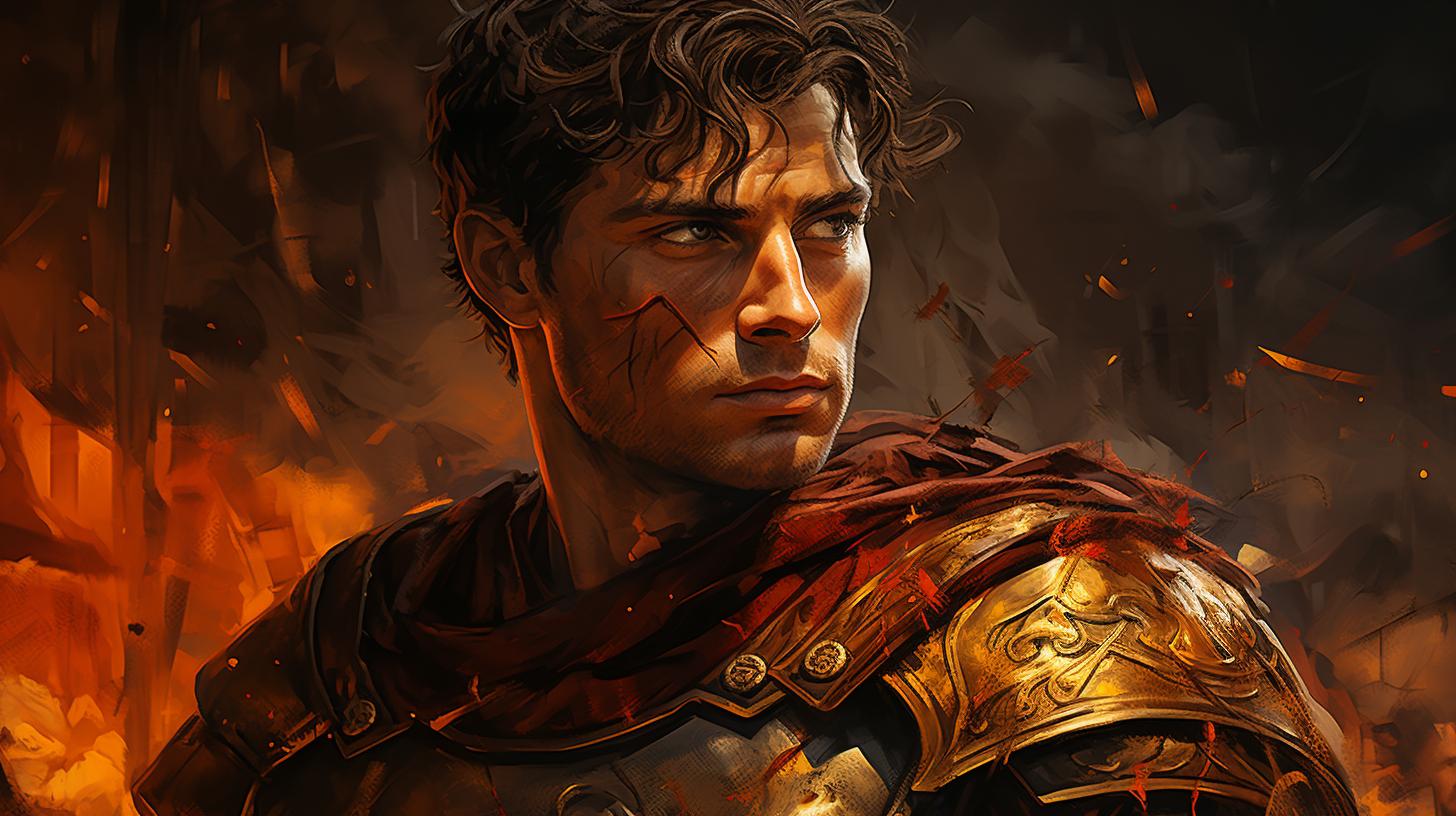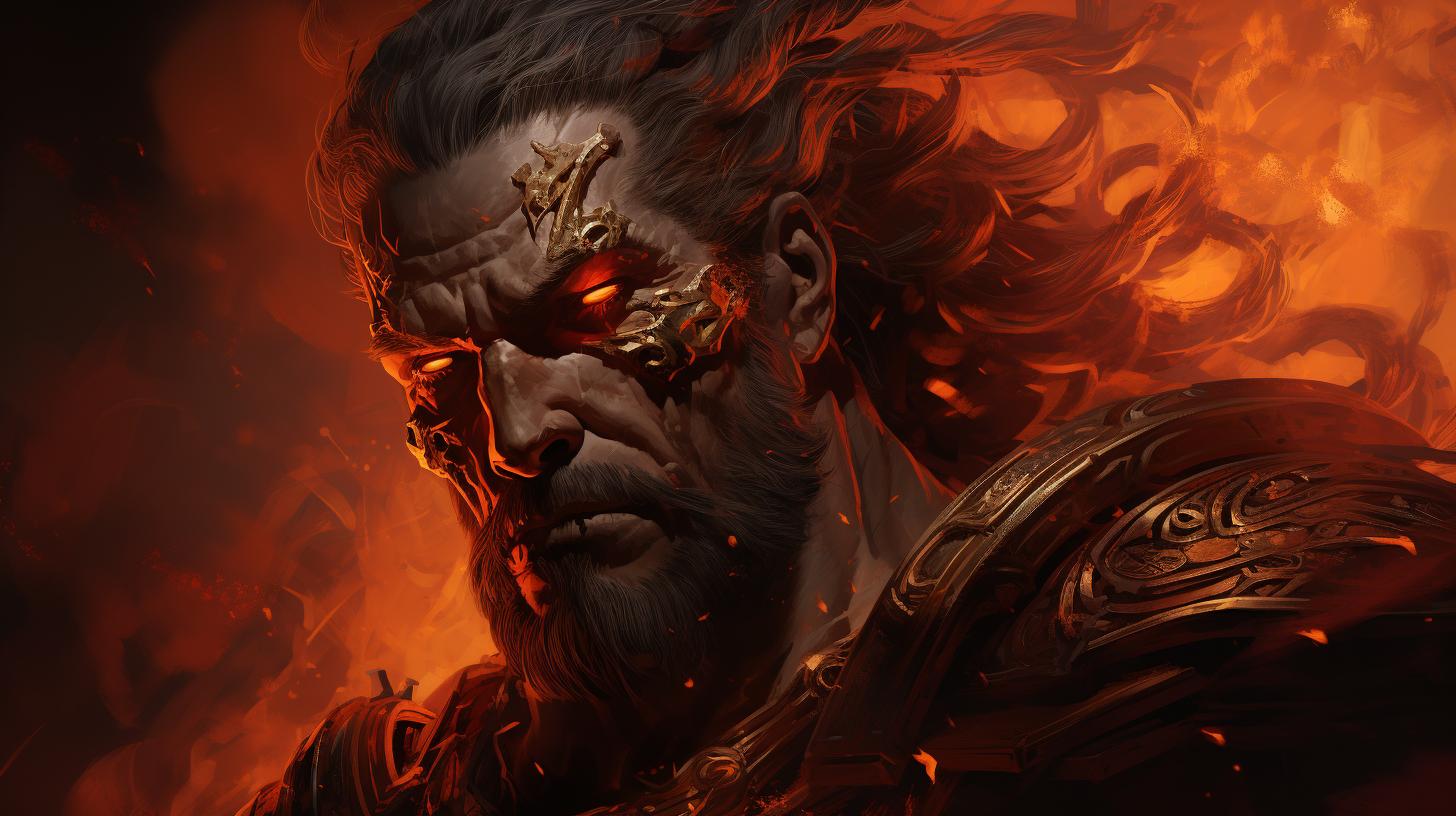Coeus Greek God: The Wisdom and Power of the Titan of Intelligence
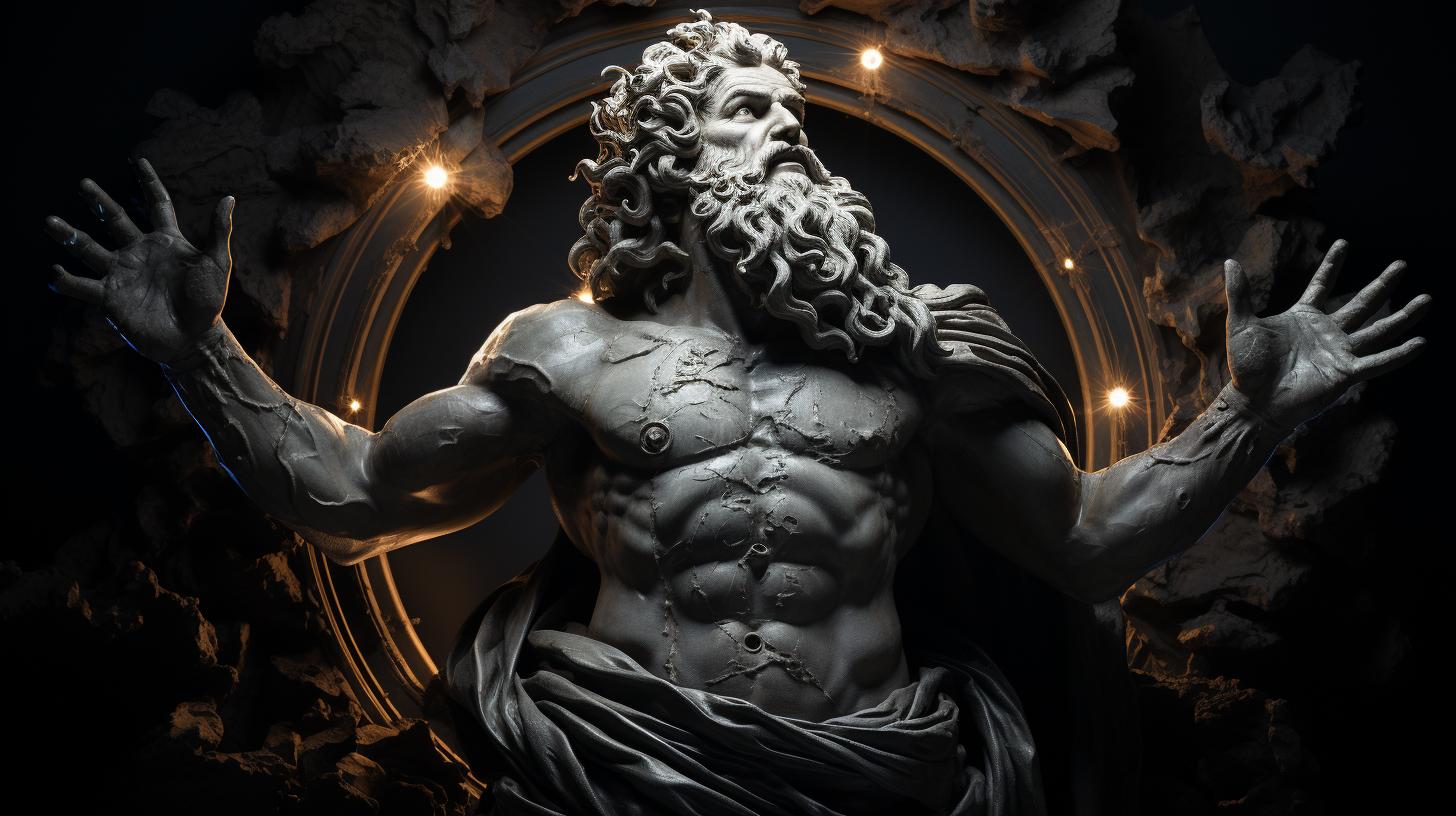
Coeus, the Greek god of intelligence and foresight, holds a significant role in Greek mythology. Born from Uranus and Gaia, and married to his sister Phoebe, Coeus is considered the god of the North and the Celestial Axis.
Together, they are the progenitors of knowledge in the cosmos. Coeus’s children, such as Leto and Asteria, play important roles in the mythology, while his grandchildren, Apollo and Athena, inherit his wisdom and prophetic abilities.
Coeus also played a pivotal part in the Titanomachy, the war between the Titans and Olympians, ultimately facing consequences for rebelling against the gods.
The Mythology of Coeus
The mythology of Coeus revolves around his role as one of the Titans in Greek mythology. Coeus is the child of Uranus and Gaia, and he belongs to the first generation of Titans.
Let’s explore the different aspects of Coeus’s mythology:
The Titans: Children of Uranus and Gaia
Coeus is part of the Titan family, the children of Uranus (the sky) and Gaia (the earth). The Titans are powerful deities who ruled the cosmos before the Olympian gods.
They are often depicted as gigantic beings, representing the forces of nature and the primal elements.
Coeus and Phoebe: The Divine Union
Coeus is married to his sister Phoebe, a Titaness associated with radiance and prophecy. Their union symbolizes the harmonious balance between intelligence and foresight. Together, they emit the aura of wisdom and serve as the primordial source of knowledge in the cosmos.
Coeus’s Role as the God of Intelligence and Prevision
Coeus is renowned as the god of intelligence, resolution, and foresight. He possesses great wisdom and prophetic abilities, contributing to the success and longevity of the Titans during the war against the Olympians.
Coeus’s strategic insight and visionary nature were crucial assets in their battle for supremacy.
As the god of intelligence, Coeus holds the key to unraveling the mysteries of the universe. His profound knowledge enables him to understand the hidden workings of the celestial realms and guide others towards enlightenment.
Coeus’s Children and Their Significance
Coeus, the Greek god of intelligence and premonition, had three notable children who played significant roles in Greek mythology and history.
Lelantos: The Lesser-Known Titan
Lelantos, one of Coeus’s sons, is a lesser-known Titan but still holds importance in the pantheon. As the god of air and hunter’s skill, he possesses the ability to move unseen and unnoticed.
Lelantos’s elusive nature and expertise in tracking have been celebrated in myths and stories, making him an intriguing figure within the Titan family.
Leto: The Mother of Apollo and Artemis
Leto, a daughter of Coeus and Phoebe, holds immense significance as the mother of two influential Olympian deities, Apollo and Artemis. Leto’s union with Zeus resulted in the birth of Apollo, the god of music, healing, and prophecy, and Artemis, the goddess of the hunt and the moon.
Leto’s lineage and the extraordinary abilities of her children contribute to her prominence in Greek mythology.
Asteria: The Titaness of Nighttime and Stars
Asteria, another daughter of Coeus and Phoebe, is renowned as the Titaness of nighttime and stars. She is associated with nocturnal activities, dreams, and astrology. Asteria’s choice to transform into a quail to escape Zeus’s advancements further emphasizes her connection to the night sky.
Her presence adds depth and symbolism to the celestial aspects of Greek mythology.
Coeus’s Influence on Apollo and Athena
Coeus’s wisdom and prophetic abilities had a significant impact on his grandchildren, Apollo and Athena. As the grandson of Coeus, Apollo inherited the gift of prophecy, making him one of the most revered oracles in Greek mythology.
Apollo: The Gift of Prophecy
Apollo, the god of music, healing, light, and truth, was highly regarded for his ability to see into the future. This precognitive power originated from Coeus’s divine lineage. Apollo’s renowned oracle at Delphi made him a sought-after source of guidance for mortals and gods alike.
- Apollo’s prophecies played a crucial role in various mythological tales and epic quests, guiding heroes such as Jason and Theseus in their endeavors.
- His wisdom influenced important decisions made by rulers and leaders, ensuring the prosperity and success of civilizations.
- Apollo’s gift of prophecy was not only a reflection of his divine heritage but also a testament to the foresight and intelligence of Coeus, his grandfather.
Athena: The Goddess of Wisdom and Strategy
Like Apollo, Athena, the goddess of reason, wisdom, justice, and military strategy, was deeply influenced by the intelligence and sagacity of Coeus.
She embodied the strategic prowess and keen discernment that Coeus exemplified as the titan of intelligence.
- Athena’s strategic counsel and guidance were indispensable to heroes such as Odysseus and Perseus, aiding them in overcoming challenges and achieving great deeds.
- Her ability to think critically and formulate effective plans mirrored the analytical and perceptive nature of Coeus, her grandfather.
- Athena’s wisdom and intelligence, derived from her lineage, established her as one of the most formidable deities in Greek mythology.
The Titanomachy: Coeus’s Role in the War
The Titanomachy was a battle of immense proportions between the Titans and the Olympians, which determined the fate of the cosmos.
In this great conflict, Coeus, the Titan of Intelligence and Prevision, played a crucial role alongside his fellow Titans.
The Titans’ Rebellion Against the Olympians
The Titanomachy was ignited by the Titans’ rebellion against the Olympian gods, led by their powerful leader, Cronus. Coeus and his siblings rose up against the Olympians, seeking to maintain their dominion and power over the universe.
Coeus’s Participation and Fate in the Battle
During the Titanomachy, Coeus demonstrated his wisdom and strategic prowess. He utilized his intelligence to aid his Titan kin in their fierce battles against the Olympians. Coeus’s ability to foresee the enemy’s moves and make calculated decisions played a vital role in the overall strategy of the Titans.
However, despite their best efforts, the Titans eventually succumbed to the might of the Olympians. Coeus and his kin fought valiantly, but ultimately, they were overpowered by the superior strength and divine powers of the Olympian gods.
The Outcome and Consequences of the Titanomachy
The consequences of the Titanomachy were severe for Coeus and his Titan brethren. After their defeat, the Olympians condemned the Titans to an eternity of punishment in the depths of Tartarus, the underworld.
Coeus, along with the other Titans, faced imprisonment in this dark abyss as retribution for their rebellion against the Olympians.
Some variations in mythology suggest that Zeus, the king of the Olympians, eventually released the Titans from their torment, while others assert that the Titans remained bound in Tartarus as a perpetual reminder of their futile rebellion.
The Titanomachy marked a significant turning point in Greek mythology, as it solidified the Olympians’ reign and established them as the dominant gods of the cosmos.
Coeus’s Legacy and Cultural Significance
Coeus, the Greek god of intelligence and foresight, has left a lasting impact on Greek mythology, literature, art, and even modern pop culture.
His influence can be seen in various aspects, showcasing the reverence and significance attributed to him throughout history.
Coeus’s Influence in Greek Mythology and Literature
In Greek mythology, Coeus is renowned for his exceptional wisdom and prophetic abilities. This made him a highly respected figure among both gods and mortals. His character often serves as a symbol of intellectual prowess and strategic thinking in ancient Greek tales and epics.
Throughout Greek literature, Coeus’s name is frequently referenced in connection to knowledge and rationality. He epitomizes the pursuit of wisdom and holds a cherished place in the stories that explore the power and consequences of intellect.
Coeus’s Symbolism and Representation in Art
The representation of Coeus in art often reflects his divine attributes and associations. He is commonly depicted as a regal figure wearing a crown, symbolizing his status as a god of intelligence.
His presence in sculptures, pottery, and other artistic mediums captures his role as a source of wisdom and insight.
The artistic portrayal of Coeus also showcases his connection to the heavens and celestial realms.
He is often depicted alongside celestial objects and stars, symbolizing his role as the god of the North and the Celestial Axis.
References to Coeus in Modern Pop Culture
Coeus’s influence extends beyond ancient mythology and literature, making appearances in modern pop culture. His name and characteristics have been incorporated into various forms of entertainment, including books, movies, and video games.
References to Coeus can be found in fantasy novels and films, where his wisdom and foresight are often associated with mystical or prophetic characters. In video games, Coeus’s name may be used for powerful beings or artifacts that grant knowledge or strategic advantages to the players.
The continued presence of Coeus in modern pop culture is a testament to the enduring appeal of his character and the timeless significance of his legacy.
FAQs about Coeus Greek God
Here are some frequently asked questions about Coeus, the Greek god:
What are Coeus’s main attributes and domains?
Coeus is primarily known as the god of intelligence, resolution, and foresight.
He is also associated with the North and the Celestial Axis. Coeus possesses great wisdom and prophetic abilities, which were instrumental in the Titans’ war against the Olympians.
How does Coeus’s intelligence contribute to the Titan’s success?
Coeus’s intelligence played a vital role in the Titan’s success during the war against the Olympians.
His foreknowledge and strategic thinking enabled the Titans to wield their powers effectively and plan their actions meticulously. Coeus’s ability to foresee outcomes and make informed decisions played a crucial part in the enduring strength of the Titans.
What is the significance of Coeus’s children and grandchildren?
Coeus and his wife Phoebe had three notable children: Lelantos, Leto, and Asteria. Through their lineage, Coeus’s intelligence and prophetic abilities were inherited by his grandchildren, Apollo and Athena. Apollo became renowned as the god of music, healing, and prophecy, while Athena emerged as the goddess of wisdom, strategy, and justice.
Coeus’s descendants continued his legacy as powerful deities with exceptional intellectual prowess.
What happened to Coeus after the Titanomachy?
After the Titanomachy, the war between the Titans and Olympians, Coeus, like many of his fellow Titans, was thrown into the abyss of Tartarus, the underworld. Some tales suggest that Zeus later freed the Titans, while others maintain that they remained in the underworld as punishment for their rebellion against the Olympians.
How does Coeus compare to other prominent Titans in Greek mythology?
- Coeus stands out as the god of intelligence, forethought, and prophecy, making him one of the most astute Titans.
- Compared to his siblings and other Titans, Coeus’s intellect and ability to see the future made him highly valuable during conflicts and decision-making.
- Although Coeus may not be as widely recognized as some of the more famous Titans, his influence on his grandchildren, Apollo and Athena, secured his place in Greek mythology.
These frequently asked questions shed light on the attributes, contributions, descendants, and significance of Coeus in Greek mythology, positioning him as a significant figure within the pantheon of gods.
.











